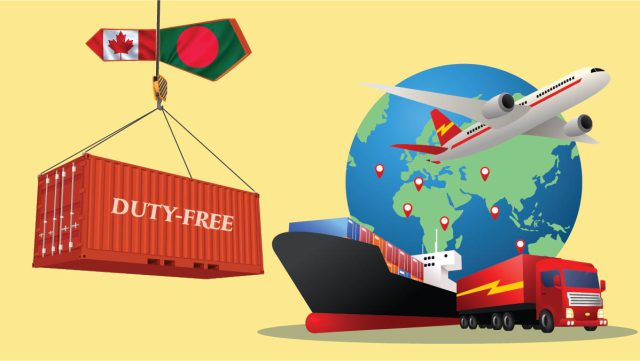Marking a remarkable milestone for international trade and economic cooperation, Canada has extended duty-free and quota-free access to Bangladeshi products until 2034. The extension, passed as a bill in the Canadian parliament in June, reflects the strong bilateral relations between the two nations and holds profound implications for Bangladesh’s economy, particularly its ready-made garment (RMG) sector. This move is expected to not only bolster trade but also propel Bangladesh towards a more sustainable and socially responsible industrial transformation.
A Long-standing Relationship and Market Access:
Bangladeshi products have enjoyed duty-free and quota-free access to the Canadian market since 2003 under the Least-Developed Country Tariff (LDCT) scheme. The scheme is part of the General Preferential Tariff (GPT) program, which aims to support the growth of economies in developing countries. This beneficial trade arrangement has significantly contributed to Bangladesh’s export growth, making Canada the 11th largest export partner for the country in the fiscal year 2023.
The importance of this partnership is particularly evident in the RMG sector. Canada stands as one of the major markets for Bangladeshi apparel, with exports totaling $1.55 billion in the fiscal year 2023, reflecting a growth of 16.55% compared to the previous year. The continuation of duty-free access is expected to further strengthen this relationship and provide an opportunity for even more substantial growth.
Towards a Sustainable and Responsible Industry:
What sets this extension apart is its focus on sustainable development and social responsibility. The new extension of the GPT scheme introduces relaxed rules of origin for apparel items and provides duty-free access to other products. Additionally, the extension’s conditions are tied to labor and environmental compliance, emphasizing the importance of responsible and ethical practices in trade partnerships.
Bangladesh’s industrial transformation is well underway, with a strong commitment to creating safer, cleaner, and more sustainable workplaces. The extended duty-free access is expected to be a driving force behind these efforts, encouraging industries to adhere to stringent labor and environmental standards. This development aligns with global trends, as consumers and businesses increasingly demand products that are produced responsibly and sustainably.
Positive Implications for Bangladesh’s Future:
Faruque Hassan, President of the Bangladesh Garment Manufacturers and Exporters Association (BGMEA), welcomed the extension, highlighting its potential to catalyze further growth and cooperation between the two nations. He expressed the view that this extended duty-free access will not only contribute to industry transformation but also support overall infrastructure development within the country.
With the introduction of the GPT+ scheme, which replaces the existing LDCT arrangement, Bangladesh anticipates smoother trade relations with fewer restrictions. Shams Mahmud, Managing Director of Shasha Denims, expressed optimism that these changes will facilitate a more seamless trade process and enhance the country’s competitiveness in the Canadian market.
As Bangladesh approaches its graduation from the Least Developed Country (LDC) status in 2026, the positive feedback received from trade partners like Canada and Australia indicates that the country’s commitment to responsible and sustainable trade practices is being recognized and rewarded.
Epilogue
The extension of duty-free access for Bangladeshi products in the Canadian market until 2034 not only strengthens trade ties but also reinforces the importance of sustainable and socially responsible business practices. As Bangladesh continues its journey towards economic growth and development, this extension provides a platform for the nation to showcase its dedication to labor and environmental compliance, ensuring a brighter and more prosperous future for all stakeholders involved.
Here are some links for our readers with valuable perspectives from reputable sources that support and expand on the ideas discussed in this article. Explore and enrich yourself.
- Global Preferential Tariffs and Their Impact on Developing Economies
- Bangladesh Garment Manufacturers and Exporters Association (BGMEA)
- Canada’s Trade Relations and Policies
- Sustainable Practices in the Textile and Apparel Industry
- United Nations’ Least Developed Countries (LDC) Program
Read more exclusive articles from our Editorial section.


















